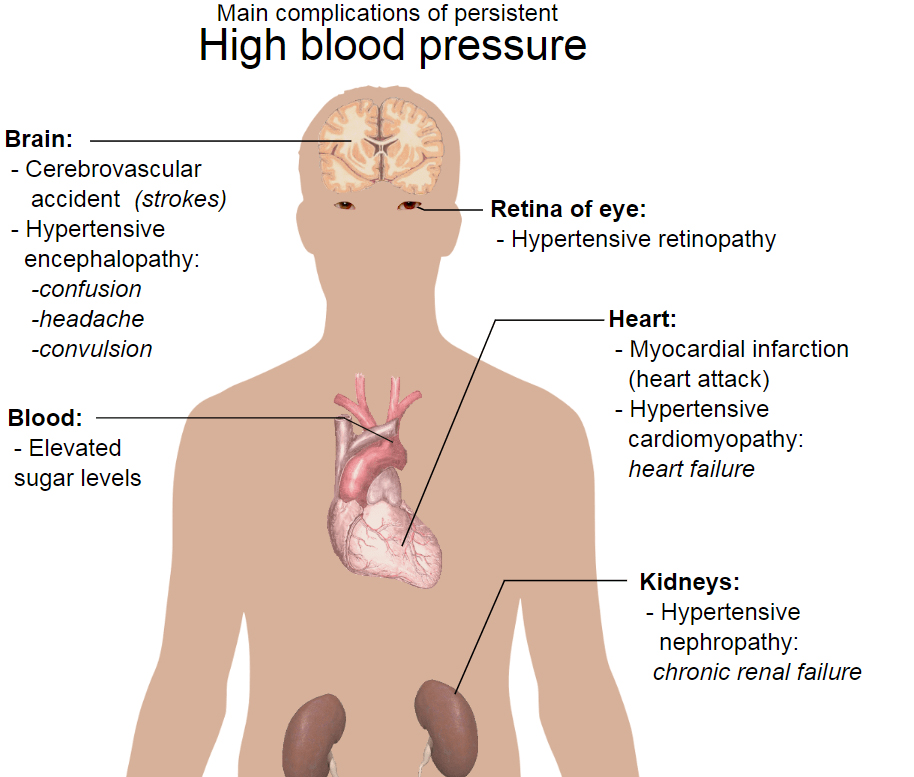“We have a habit where before one tastes the food, we are reaching for the salt, we have to change our thinking on how much you need to make a meal tasty. This mixed with other behaviours opens the risk to high blood pressure,” said Dr Noluthando Nematswerani, Chief Clinical Officer at Discovery Health.
High blood pressure is when the pressure in your blood vessels is too high (140/90 mmHg or higher). It is common but can be serious if neglected or not properly treated.

Hypertension is when someone’s blood pressure is consistently higher than normal. (Graphic: Ian Furst-CC BY-SA 4.0, https://commons.wikimedia.org)
An article in the Journal of Hypertension found that 30% of South Africans had high blood pressure but only 50% were aware and receiving treatment. The median age for hypertension was 40, with the numbers being skewed more towards men than women.
Most people don’t spot hypertension until it has morphed into severe illnesses such as stroke and heart disease. Health practitioners and health advocacy organisations say the food industry and government can help by reducing sodium levels in food products, especially processed foods. However, practitioners are also educating people on unhealthy habits that lead to hypertension and encouraging people to get their blood pressure checked.
Nematswerani said, “We are just sending the message that this is a simple test that can save you from severe complications such as kidney damage, heart conditions and even dementia”.
Dr Noluthando Nematswerani has encouraged people to test their blood pressure as most people with hypertension are unaware of their condition. (Photo: Discovery Health)
The Heart and Stroke Foundation (HSFSA) has been raising awareness of the benefits of reducing salt consumption, stating it is one of the most efficient ways to reduce blood pressure and improve overall health.
In a statement CEO, Professor Pamela Naidoo, of the HSFSA said:
“Few people realise that there is salt naturally contained in foods, and hence by adding salt to their food, unintentionally consume a far higher amount of salt per day, exceeding the WHO’s recommendation of 5g (or 1 level teaspoon) of salt per day. The World Health Organization (WHO) recommends we consume no more than 5g a day, from all sources. If population salt intake reduces to 5g a day, 1.65 million deaths from CVD [cardiovascular disease] can be prevented.”
 Weekly Health News and information- Quanlim Life/Lifeiselect - Health 22nd May 2024
Weekly Health News and information- Quanlim Life/Lifeiselect - Health 22nd May 2024
The foundation has had a blood pressure testing drive and a social media competition that aims to educate on salt consumption.
Tackling food industry salt content
The foundations say although personal habits are a factor in high blood pressure prevalence in 2024, their call to action focuses on the food industry, inclusive of food companies, fast food outlets and restaurants.
“The food industry in general needs to be transparent about what ingredients are contained in the food items sold,” said Naidoo.
The best way of doing this, continued Naidoo, is by ensuring that accurate information is reflected on front-of-pack nutrition labels. Naidoo also emphasised that the public and consumers need to fully understand food labels to ensure that they are spending their hard-earned income on food that is nutritious and not harmful, at all ages during their lives. Food labels allow one to distinguish between healthy and unhealthy options. Knowing the details on a food label is very empowering.
Nematswerani said a critical factor is unhealthy food being cheaper and more accessible than healthy options. She believes in the ‘one home, one garden’ method, saying it makes a difference in giving access to some of the nutritional food one needs daily.
“I think we have made healthy food inaccessible and expensive while we have made processed, unhealthy food accessible and that is our problem. When you need something to eat you will have access to a fried fish and chips, or a burger. But if you are looking for fruit and a nice balanced salad you will struggle to find it and you will pay more, so affordability becomes a factor,” said Nematswerani.
The National Department of Health along with other relevant government departments have channelled efforts towards salt reduction over the years to reduce non-communicable diseases that arise after hypertension. Health advocates have acknowledged that the country is the “first country globally to develop mandatory legislation to reduce sodium levels across a wide range of processed food categories.

Main complications of persistent high blood pressure. (Illustration: Mikael Häggström-CC0, https://commons.wikimedia.org)
Hypertension symptoms
According to the World Health Organization symptoms can include:
- severe headaches;
- chest pain;
- dizziness;
- difficulty breathing;
- nausea;
- vomiting;
- blurred vision or other vision changes;
- anxiety;
- confusion;
- buzzing in the ears;
- nosebleeds;and
- abnormal heart rhythm.
Most healthcare centres begin by testing with a blood pressure cuff before consulting and investigating potential illnesses.
Nematswerani says that even though these can be generic symptoms, making an appointment and getting tested at a healthcare centre and can save your life.
“We would like to encourage people to listen to their bodies and present themselves to healthcare centres. It’s unfortunate that most diagnoses are made when it’s already escalated to heart disease or a stroke,” said Nematswerani.
COMMENTS - Again is just another Symptom related issue- that is not practical on all people.











